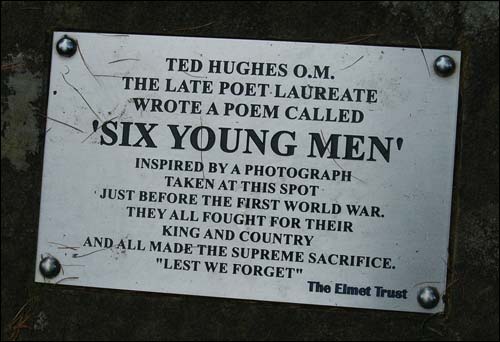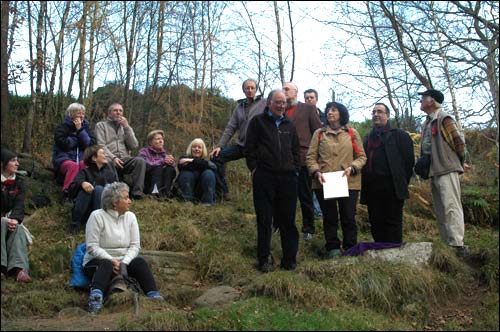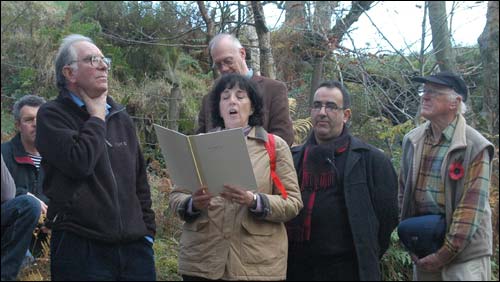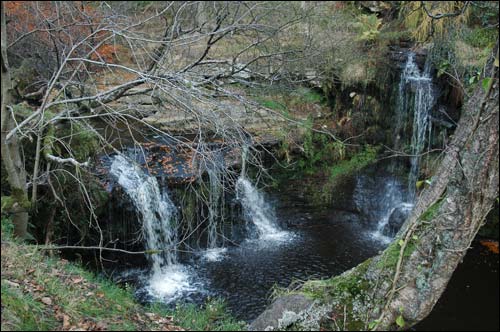
Six Young Men
- a plaque is unveiled at Lumb Falls to remember Ted Hughes and six men killed in WW1
Sunday, 4 November 2007
Ted Hughes wrote a poem inspired by a photograph of six young men taken at Lumb Falls near Hebden Bridge early last century. All six men were killed in the First World War.

As we approach Remembrance Day, in memory of our most distinguished local poet and remembering these six men, a plaque was today unveiled at Lumb Falls, at the same spot where the original photo had been taken.

The unveiling of the plaque was by Mayor of Hebden Royd Council, Cllr Nader Fekri. Among those present were Donald Crossley, former friend of Ted Hughes, Alan Fowler, chair of Wadsworth Parish and members of the Elmet Trust who put up the plaque.

Six Young Men
The celluloid of a photograph holds them well -
Six young men, familiar to their friends.
Four decades that have faded and ochre-tinged
This photograph have not wrinkled the faces or the hands.
Though their cocked hats are not now fashionable,
Their shoes shine. One imparts an intimate smile,
One chews a grass, one lowers his eyes, bashful,
One is ridiculous with cocky pride -
Six months after this picture they were all dead.
All are trimmed for a Sunday jaunt. I know
That bilberried bank, that thick tree, that black wall,
Which are there yet and not changed. From where these sit
You hear the water of seven streams fall
To the roarer in the bottom, and through all
The leafy valley a rumouring of air go.
Pictured here, their expressions listen yet,
And still that valley has not changed its sound
Though their faces are four decades under the ground.
This one was shot in an attack and lay
Calling in the wire, then this one, his best friend,
Went out to bring him in and was shot too;
And this one, the very moment he was warned
From potting at tin-cans in no-man's land,
Fell back dead with his rifle-sights shot away.
The rest, nobody knows what they came to,
But come to the worst they must have done, and held it
Closer than their hope; all were killed.
Here see a man's photograph,
The locket of a smile, turned overnight
Into the hospital of his mangled last
Agony and hours; see bundled in it
His mightier-than-a-man dead bulk and weight:
And on this one place which keeps him alive
(In his Sunday best) see fall war's worst
Thinkable flash and rending, onto his smile
Forty years rotting into soil.
That man's not more alive whom you confront
And shake by the hand, see hale, hear speak loud,
Than any of these six celluloid smiles are,
Nor prehistoric or, fabulous beast more dead;
No thought so vivid as their smoking-blood:
To regard this photograph might well dement,
Such contradictory permanent horrors here
Smile from the single exposure and shoulder out
One's own body from its instant and heat.
Ted Hughes
At first reading this poem is about the futility of war; particularly the first world war. Hughes's father had come through the First World War, psychologically scarred by his ordeal and the trauma of witnessing the slaughter of nearly all his friends and fellow soldiers at Gallipoli in 1915. Hughes's father was one of just two per cent of his regiment to survive.
Newsnight Review critic Tom Paulin has pointed out that Ted Hughes, having been born in 1930 belonged to 'that slightly different species' - a generation 'who took in the blood of the First World War with their mother's milk, and who up to their middle age knew Britain only as a country always at war, or inwardly expecting and preparing for war…'
However, this poem does more than attack war. It is also about the knowledge of our own death and non-existence. We are reminded that one day all that will be left of us will be a smiling face in a photograph.
We try to make sure that the Hebden Bridge Web news is correct, but if you are aware of any errors or omissions, please email us If you have comments on Hebweb news please make a contribution to our discussion forum
© Hebden Bridge Web |